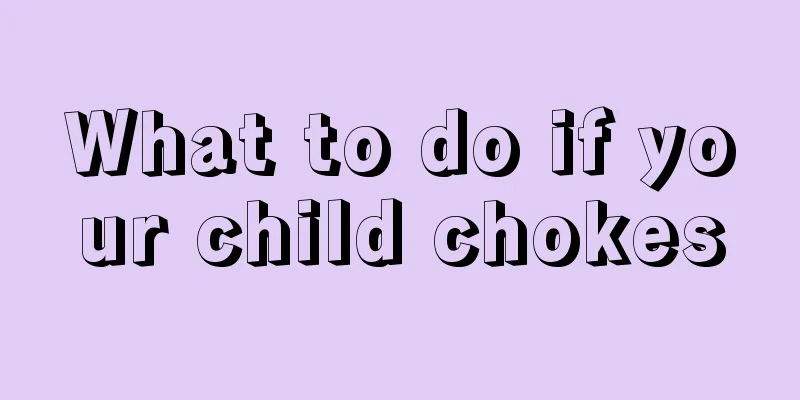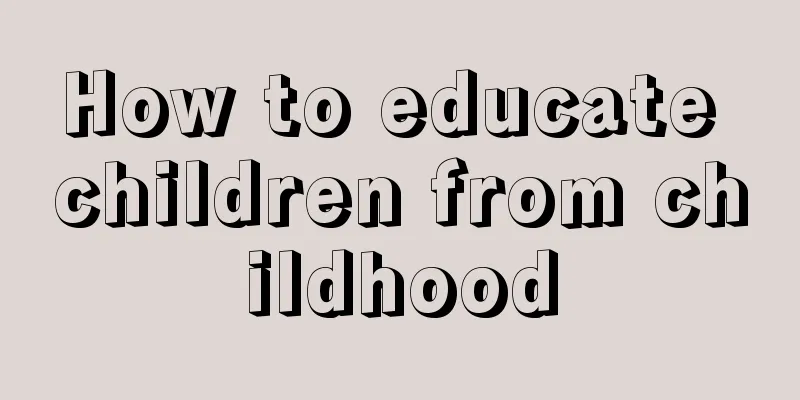What to do if your child chokes

|
Children often choke on milk when they are young. When children have this phenomenon, we must help them adjust, because this phenomenon is very dangerous. Many children often choke on milk and develop tracheal diseases. Because our tracheal opening is connected to the opening of the trachea, their functions are indeed different. So what should we do if a child chokes? Since the opening of the esophagus and the opening of the trachea are connected in the throat, when swallowing, breathing will be temporarily stopped to allow food to enter the digestive tract through the esophagus. However, if milk accidentally enters the trachea when the baby is drinking milk, it will cause an uncomfortable reaction, which is the so-called choking. Generally speaking, there are three main reasons why babies choke on milk: first, the baby's posture is not good when drinking milk, causing milk to enter the respiratory tract directly; second, the baby's stomach capacity is too small, or the esophagus and paraesophageal sphincter are immature and cannot be closed tightly, causing milk to flow back into the esophagus (vomiting). If the baby is inhaling at this time, it will cause choking; third, the hole in the nipple is too large, and the baby has no time to swallow, so the excess milk enters the trachea. If it is a mild choking, the baby will usually adjust his breathing and swallowing movements by himself, and the danger is relatively low. Parents only need to observe the breathing condition and skin color. However, if the choking is more serious, it may cause bronchitis or pneumonia. In addition, parents should be more careful that if the amount of milk is too large or there are milk lumps, it will directly block the baby's respiratory tract, causing hypoxia, which may lead to sequelae of brain nerve centers and even be fatal. Therefore, if the baby often chokes on milk, parents need to thoroughly understand the reason. Otherwise, even if there is no temporary health risk, the baby may refuse to drink milk due to the discomfort of choking, which will affect the baby's development in the long run. Pediatric experts recommend that parents follow the following principles to prevent their baby from choking on milk: 1. After making the milk, turn the bottle upside down first, or buy a nipple with an exhaust hole to prevent choking. 2. When feeding, observe the baby's reaction. If milk is seen in the corners of the mouth, you should slightly remove the nipple and take a break (the same applies to babies who are breastfed). 3. The best feeding posture is to raise the upper body a little, forming a 30-45 degree angle with the lower body. The head should not be lower than the body. The bottle should be tilted at 45 degrees to the baby's mouth, so that the baby will find it more difficult to inhale air. 4. You can stop during feeding to pat your baby's back to expel air from the stomach to avoid choking due to spitting up milk. (The same applies to babies who are breastfed) After feeding, it is best to develop a habit of cleaning the baby's mouth, and do not let the baby lie flat on the bed. |
<<: Does hip-hop dancing affect children's height?
>>: What kind of milk can make children grow taller?
Recommend
Is zinc gluconate good for children?
If a child is lacking in glucose and zinc, he or ...
What should children eat for dry eyes?
Children are the future of a family. China has a ...
What to do if your baby is sleepy and anorexic
Many parents will notice such a problem: the baby...
What are the benefits of children learning Latin dance?
Latin dance is one of the most popular types of d...
What causes black spots on the white of a child's eye?
In our lives we can find that a baby's eyes a...
What is the reason for yellow urine in babies?
Nowadays, most families have only one child. A ch...
Can children drink Isatis root frequently?
Although Isatis root is a traditional Chinese med...
What to do if you have a baby with Down syndrome
No one wants to have a baby with Down syndrome. W...
What to do if your three-month-old baby has green poop
Every parent will be very happy and joyful watchi...
Ten basic skills that children must learn
Many mothers love their children so much that the...
Why is the baby's scalp blue?
After becoming a mother, every move of the child ...
What is the standard of fetal development at six months?
Each developmental stage of a child is different,...
How to treat Mycoplasma pneumoniae infection in children?
Mycoplasma pneumoniae infection is a very common ...
What foods should children not eat when they have a fever? Every parent should see clearly
When a child has a fever, parents will be very an...
What does it mean for children to have allergic constitution?
As we all know, allergies are a common problem in...









